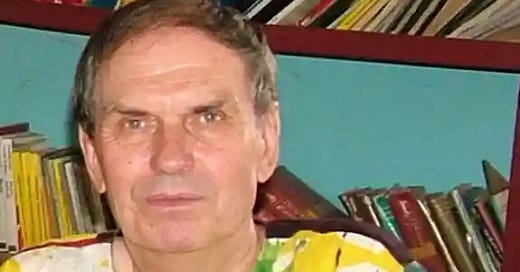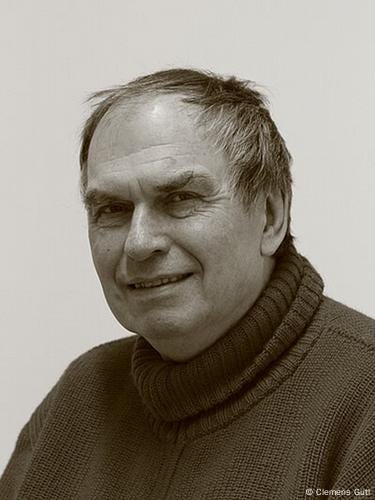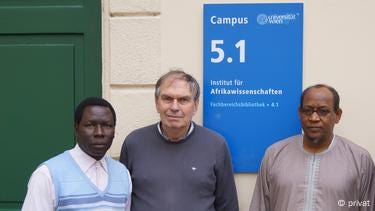The Nigerian linguist who brought Europe and Africa closer
"Norbert Cyffer was a bridge. He was the reason Kanuri became known to European scholars," said Abba.
Abubakar Said Saad
Norbert Cyffer, who brought global attention to Nigeria’s linguistic diversity, has died aged 81. His passing raises questions about the future of African language studies in Europe.
https://p.dw.com/p/4rvuR
Norbert Cyffer file photo
Norbert Cyffer, seen here in a file photo, was instrumental in bringing Kanuri to the academic community's attentionImage: Privat
The academic community is mourning the loss of emeritus professor Norbert Cyffer, who is renowned for his extensive research on African languages, particularly Kanuri.
Linguist had long studied Kanuri, spoken by approximately 10 million people across Nigeria, Cameroon, Niger and Chad, but little academic works had been published on the language. Cyffer's contributions enriched linguistic scholarship and raised important questions about the future of African language studies in Europe.
African languages: A neglected field in academia?
When he first encountered Kanuri, Cyffer was struck by its vast number of speakers and its lack of academic attention. In a 2015 report titled "In the Name of Grammar," which he co-authored with other scholars, Cyffer pointed out that despite having a comparable number of speakers to Finnish, Kanuri "remains neglected in academic research."
Determined to change this, he spent over four decades studying Kanuri's grammar, language documentation, and its role as a second language. Starting in the late 1960s, Cyffer spent time with Kanuri-speaking communities, recorded their language and music at a time when very few academics ventured it such regions. His recordings also shed light on the cultural diversity of Nigeria's border regions with Niger and Chad. Cyffer's efforts also contributed to the development of the Kanuri dictionary, further cementing his role in advancing the language's visibility.
Reflecting on Cyffer's contributions, Tahir Abba, a senior lecturer in linguistics at Kano's Bayero University, and a former student of Cyffer, recalled a defining moment in the field. During Cyffer's time in Nigeria, he played a crucial role in developing the first Standard Kanuri Orthography (SKO), a widely used spelling system that continues to serve as a linguistic benchmark. Before that, there was no standard orthography or spelling of Kanuri.
File photo shows Norbert Cyffer, who collaborated with the Universities of Vienna, Prague and Maiduguri on his Nigeria-based reasearchFile photo shows Norbert Cyffer, who collaborated with the Universities of Vienna, Prague and Maiduguri on his Nigeria-based reasearch
Cyffer collaborated with the Universities of Vienna, Prague and Maiduguri on his Nigeria-based researchImage: Clemens Gütl
Bridging the gap between African and European linguistics
Beyond his research, Cyffer was widely regarded as a mentor and a key figure in fostering cross-continental collaboration. His guidance, according to scholars like Abba, shaped the careers of many emerging African linguists, strengthening academic ties between Africa and Europe.
"Norbert Cyffer was a bridge. He was the reason Kanuri became known to European scholars," said Abba.
His influence extended beyond Africa, inspiring scholars across Europe to study Kanuri and other African languages.
"Today, his students are spread across Europe," Abba noted. "And we in Africa maintain close ties with them, ensuring a sense of continuity in his work."
Cyffer's publications, including "A Sketch of Kanuri" and "The Kanuri Language: A Reference Grammar" remain foundational texts in the field of Kanuri studies.
What lies ahead?
Cyffer's passing is a profound loss, but it does not signal the end of Kanuri language studies.
"His departure marks a new beginning," argues Abba, emphasizing the responsibility of the global linguistic community to carry forward his work.
The challenge now lies in ensuring the study of African languages remains an academic priority. Cyffer's contributions have paved the way, but has also enabled future scholars both in Africa and beyond to sustain and expand this knowledge, keeping the bridge between continents intact.
Norbert Cyffer with with Nigerian professors Andrew Haruna and Umara Bulakarima Norbert Cyffer with with Nigerian professors Andrew Haruna and Umara Bulakarima
Norbert Cyffer with Nigerian professors Andrew Haruna (left) and Umara Bulakarima from the University of Maiduguri. When the security situation in northern Nigeria became dangerous in 2013, the researchers had to meet in ViennaImage: private
Abubakar Said Saad Sa’id Sa’ad is Nigerian writer and multimedia journalist currently based in Germany.
@saidsaadwrites
Deutsche Welle





